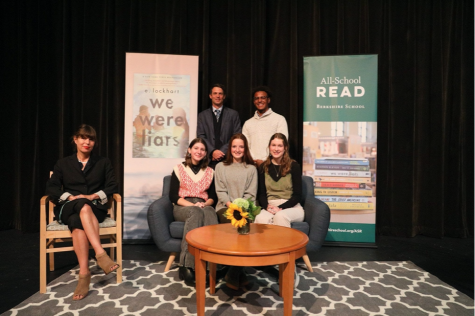All School Read 2021: An Evening With E. Lockhart
October 15, 2021

On Thursday, September 30th, the Berkshire School community filed into Allen Theater not for morning meeting, but an evening of literature, inspiration, and community.
Berkshire’s 2021-22 All School Read book is We Were Liars, a suspenseful young adult novel that thoughtfully examines consequences, privilege, and the power and pitfalls of family. That drizzly Thursday evening, the Berkshire community had the honor of welcoming the author of We Were Liars, E. Lockhart.
As the students settled into their seats, Dr. John Hyland, chair of the All School Read committee, took to the stage. He welcomed the Berkshire community and then introduced Phoebe Smith ’22, who would officially introduce Lockhart to the students and faculty.
Smith’s introduction was well crafted and eloquent. I had the opportunity to speak with her regarding the event, and as Smith reflected on the evening, she said, “Being a student moderator allowed me to guide the conversation towards our community, whereas introducing E. Lockhart gave me the responsibility of establishing the vibe of the All School Read event.”
Smith’s introduction set the stage for E. Lockhart’s brief presentation. She joked with the audience, moved furniture around, and sipped a can of seltzer, all in a successful effort to make the room feel at ease. Her presentation consisted of four stories related to the plot of her book, all of which were connected to Lockhart’s personal philosophy or childhood.
As she discussed coming of age in a commune, her grandparent’s house on Martha’s Vineyard, and her mother’s collection of old fairy tales, Lockhart provided a contextual understanding of herself as a writer and person.
This understanding was furthered by the questions asked by the student moderators. After Lockhart’s presentation, DeVon Thompson ’22, Samantha Bernstein ’22 and Phoebe Mulder ’22 joined her on stage to talk about her writing process and details from the text. The student moderators worked with Dr. Hyland in the weeks leading up to Lockhart’s arrival to solidify their understanding of We Were Liars and craft engaging, leading questions.
However, as the event was live and the moderators tried to make the conversation flow naturally, it wasn’t possible to prepare everything ahead of time. I spoke with Thompson, who revealed how he had to think on his feet as a moderator when he asked a question about the presentation Lockhart gave only minutes earlier.
Thompson explained, “The author claimed that for art to be good the creator must have emotional inspiration. Therefore, I asked the author if writing something that stemmed from negative emotional inspiration is hard. Her response was simple: yes. But, those hard emotions are what makes the art pure!”
Thompson touches here on a common theme of the evening: emotion in art. Lockhart shared that she finds literary inspiration in the intersection between two conflicting emotions. When she draws upon feelings of anger and love at the same time, for example, she can create some of her best work.
Other themes of the night included privilege and wealth. The main character, Cadence, is an heiress to a large fortune and the first-born daughter of a prominent, wealthy East Coast family. Cadence’s reckoning with her place in both the world and her family encourages the reader to reflect on white privilege and class privilege.
Lockhart ended the evening with a reminder to all: be a little kinder than you have to – a reference from We Were Liars and advice which falls in line with much of what was discussed in her presentation and the student-led panel.
As the night came to a close, some students headed to study hall and others remained for book signings and a meet-and-greet with the author. However, all were left with a clearer understanding of We Were Liars and a unique insight into E. Lockhart’s writing process.
